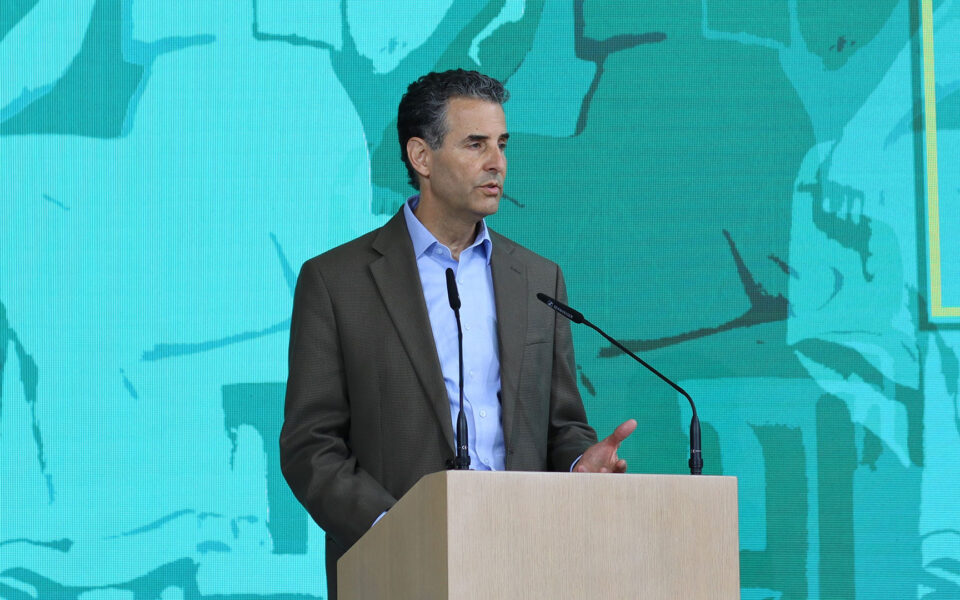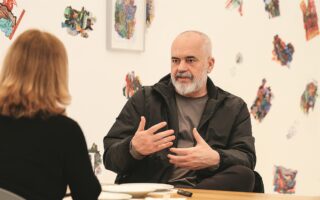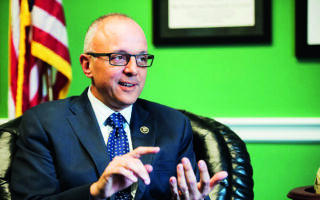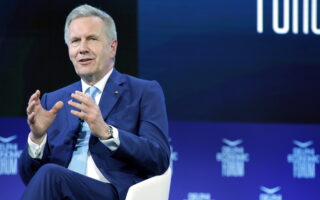Deep appreciation for Greece in Washington
US Congressman calls for sustained commitment to cooperation after Sunday’s polls, discusses emergent global challenges

“We live in an increasingly hostile and unpredictable world, so it is crucial to nurture strong alliances with countries that share the same values. The relationship between Greece and the United States, two countries with interrelated geopolitical interests, and common values, emerges as a critical partnership in the Eastern Mediterranean,” says John Sarbanes, member of the US House of Representatives and a prominent constituent of the Congressional Hellenic Caucus. “The longstanding alliance between the United States and Greece is deeply appreciated in Washington.”
With the Eastern Mediterranean becoming an increasingly hot topic in American policy circles, Sarbanes notes that Greece’s next-door neighbor, Turkey, which recently underwent a crucial electoral battle that renewed the term of the incumbent for another five years, does not enjoy the same positive reception. «” have no reason to trust [Turkish President Recep Tayyip] Erdogan. He has a lot to overcome if he is to earn my good faith, and I know well that the same applies to a lot of other members of Congress.” Recent Turkish statements that seem to diverge from its past revisionist behavior are “welcomed, but with Erdogan, you have to wait and see if actions will actually support words. And frankly, the words themselves can change tomorrow. It is time that he begins to act in a more responsible way.”
Turkey & F-16s
Tensions in Greco-Turkish relations are rising, as the latter is pursuing a 20-billion-dollar arms agreement with the United States. The deal, which entails the purchase of F-16 fighter jets that have incessantly been used by Turkey to not only breach Greek airspace but to pursue military operations in the entire region, has been used by Turkey as leverage to lift the “embargo” on Sweden’s NATO accession process. “Erdogan has attempted to link the F-16 sale to Sweden’s NATO membership and has noted significant successes in some quarters which have been convinced that the enlargement of the Alliance is exclusively conditional upon the weapon transfer. But that perception should not gain more traction,” he argues, echoing Senator Bob Menendez’s arguments that claim the US should not cave to Turkish pressures and reward “belligerent” behavior.
‘With Erdogan, you have to wait and see if actions will actually support words. And frankly, the words themselves can change tomorrow’
But even if it does approve Sweden’s membership, Sarbanes thinks more steps need to be taken. “Certainly, approving Sweden’s membership is a first step, but Turkey will need to demonstrate good faith in more areas. Erdogan needs to step away from the Blue Homeland doctrine, stop the overflights over the Aegean and rectify the country’s human rights record.” Stressing the premise of Sweden’s membership, he notes that enlargement of the Alliance is about “strengthening regional security, and not just military capabilities. Bolstering the existent framework from the inside is critical, so by rewarding Turkey’s aggressive behavior in the Eastern Mediterranean or its embargo on Sweden’s membership bid, we move in two opposite directions.”
Energy
Sarbanes serves on the House Energy and Commerce Committee with environmental and energy issues being at the core of his legislative work. “Greece has a strategic position in terms of energy,” he underlines, arguing that the level of cooperation has been intensifying since the passage through Congress in 2019 of the Eastern Mediterranean Security and Energy Partnership Act. Echoing his 2022 interview for Kathimerini, in which he argued that Greece, and especially the port of Alexandroupoli, could become an important innovation hub in the region, he says that “though an undoubtedly exciting and tangible example of Greek-American cooperation, the port of Alexandroupoli is not a project developed in isolation. It represents a broader relationship that can be traced back to the 2019 act, and which has been functioning as a springboard for a number of initiatives in the region.”
He also reveals that his current focus, alongside Senator Menendez and Greek-American Republican Gus Bilirakis of Florida, is ushering the US-Greece energy partnership to a new level through the establishment of an Eastern Mediterranean Energy Center within the US Department of Energy. “This concrete product of the Eastern Mediterranean Act would function as a site of sustained research, innovation, and collaboration on energy matters. It wholly represents the interests of Congress and would deepen regional cooperation.”
Continuity
The upcoming two-year period, however, may involve major shifts in Greek-American relations, as the two countries face critical elections. Sarbanes is following developments in Greece both as a politician and as a member of the Greek diaspora. “Regardless of which government is elected to office this Sunday, the commitment to the strong bonds between the US and Greece must endure. I hope that the continuity of our cooperation, which has been benefiting both countries for the past decades, will be the baseline for the new administration.”
The Democratic congressman may have renewed his term as Maryland’s third district representative last November, but the 2024 presidential election is a showdown that concerns him. “There is a lot of cynicism in America today, as a lot of people are being misled by demagogues like Trump and believe that the entire system is corrupt,” he comments, predicting that if Trump is indeed selected as the Republican candidate, negativity and toxicity will return to the political dialogue. “Despite President Biden’s efforts to keep the conversation elevated, I am convinced that Trump will try and pull it down,” he says, while he believes that the former president’s indictment is not likely to affect his standing within the party. “The manner in which he has tried to deflect the charges against him, calling them a witch hunt and presenting them as Biden’s political ploy against him, signals his intentions to resume his usual rhetoric. And his voter base still seems to rally around him.”
The possibility of candidates like Ron DeSantis or Mike Pence emerging victorious from the Republican National Convention next year is slim, according to Sarbanes. “Such a scenario would require an internal reckoning among the Republicans, and at this point there is no evidence to suggest that the party has what it takes to do that. But, in the unlikely case that the indictment does cause Trump to lose traction, we should expect a battle royale within the Republican party, a war of all against all.”
But even if Trump is not the nominee, Sarbanes thinks it is going to be a tough election season anyway, mostly because of the general atmosphere on the domestic political scene. “Trump has done lasting, but hopefully not irreversible, damage to American politics. He nurtured and weaponized the cynicism, distrust of government, and disillusionment that many Americans felt and used it to advance his own position. Though he did not create them, Trump identified those grievances and masterfully bred the divisive reality we see today.” The promise that the end of Trump will bring an end to cynicism seems unlikely for the Democratic congressman, who instead believes that reversing the damage will be the “work of decades and not something that can be cured overnight.” Adding to his commentary on the state of affairs, he mentions that “we live in a world of rampant disinformation and misinformation, where people are locked in restrictive states of mind, and convincing them of alternative sets of facts presents an arduous task,” while he appears convinced that the only way to accelerate national healing and restore the public’s confidence in government would be the expulsion or defeat of Trump, which would “revert the Republican Party to its former status of accountability and responsibility.”
Elections
A repeat of the 2020 presidential election poses the most likely outcome. And in this rematch between Trump and Biden, Sarbanes is betting on the latter. “President Biden projects a more optimistic view of America’s potential and role on the world stage, as seen by his policy record on issues like infrastructure, manufacturing, energy security, and climate change.” Still, he is apprehensive about the political atmosphere in 2024. “If American politics have taught us anything these past few years, it is to be careful about making predictions.”
When asked about the Greek community’s number one priority as the 2024 election nears, he cites the economy. “The world has been through a very difficult period; many in the community are in the private sector, running small or medium-sized businesses, and they call for certainty and predictability when it comes to the economy,” he says, arguing that market stability can only be achieved in Biden’s America. “The chaotic, confusing, and uncertain situation that would develop if the former president gets tenure is not in the best interest of Greek Americans.”
Sarbanes’ portfolio also features the contentious questions of social media and artificial intelligence regulation, two issues that are “extremely worrisome.” His assignment to the Committee of Energy and Commerce placed him at the center of the congressional investigation into TikTok. He argues that technology giants’ commercial interests supersede all other considerations. “The issue with all social media platforms, including TikTok, is that they are not aspiring to high standards for content moderation, and thus fail to shield their billions of users from misinformation. We are also in the dark regarding data management and storage. What is all the data being used for, who has access to it, and to what end?” For the author and sponsor of the No Child Left Inside Act, a bill promoting climate education and youth welfare, the relationship between those corporations and children is the most problematic area. “Plenty of evidence suggests that an ever-increasing number of younger consumers develop an addiction to those platforms,” he says, accusing social media companies of intentionally using mechanisms that capture children’s attention. “Social media executives and developers do not let their children use these apps, exactly because they know their harmful effects, and that to me seems like the most powerful piece of evidence that we need to regulate.”
“Congress should be doing more to regulate those social media platforms, too, following the paradigm set forward by the European Union. But, if misinformation and disinformation are a burning fire, then artificial intelligence is gasoline poured on that fire,” he says, contending that this is the next global threat, for which the world is entirely unprepared. “Developers come to us and practically plead for regulation. The scariest thing for them is not what the product can do, but rather the pace of development. The distance traveled by AI in the last two years was supposed to have taken 10 or 15 years instead. And yet, this distant future is here now, and we are not keeping up!” Sarbanes argues that technology is galloping ahead of regulators and their ability to put sensible restraints on it and predicts that the disruptiveness of AI will make the internet revolution look insignificant in comparison.
‘My father’s character as a Hellene was a compass for his work in Congress, and our family wanted to ensure that his appreciation for Greece remained part of his legacy’
The Paul S. Sarbanes ’54 Fund for Hellenism and Public Services
Princeton University is the home of the Paul S. Sarbanes ‘54 Fund for Hellenism and Public Service, an initiative that is meant to honor the legacy of his late father. “My father’s character as a Hellene was a compass for his work in Congress, and our family wanted to ensure that his appreciation for Greece remained part of his legacy. The program aims at advancing the study of contemporary Greek politics and Greek-American relations in a multidisciplinary manner, by supporting research in subjects ranging from economics to education and the arts.”
Asked why Princeton was selected as the host institution of this significant contribution to the study of Greece, he responds: “Princeton was the perfect institution for this initiative because it was Princeton that changed his life. It was Princeton who discovered him in a small town on the Eastern shore of Maryland where he was working in the family restaurant. It was his ticket to the American dream, so he wanted to give back.” Sarbanes seems hopeful for the future of the program and of the spark of Hellenism persisting in the United States. “It is almost 10 years old now, and we are very happy with how it has evolved. We are especially grateful to the Center for Hellenic Studies and Dimitri Gondicas for all their work. My father was there when we started the program, and I am pretty sure that he would have been very proud of how it has evolved, and of the opportunities it provides to young people interested in advancing US-Greece relations.”
John Sarbanes visited Athens this week to deliver the keynote address at “Power and Purpose: A Symposium on Mental Health and Democratic Agency,” hosted by the Stavros Niarchos Foundation Agora Institute of Johns Hopkins University.
He also addressed an audience of students and academics at the Princeton Athens Center.





